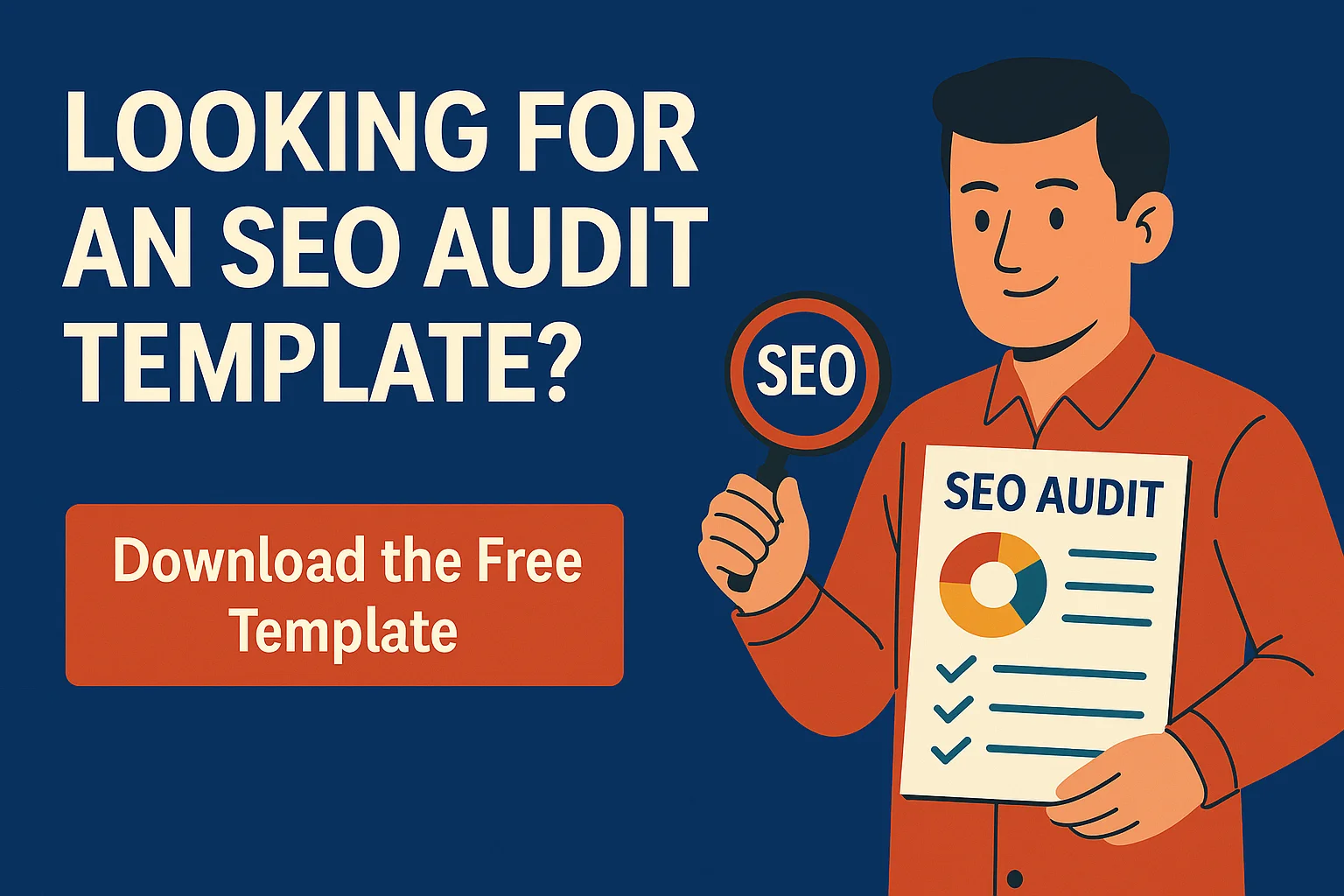Real estate is changing faster than most agents can refresh their listings. In 2025, visibility isn’t just about having a nice
website; it’s about showing up exactly where motivated buyers and sellers are searching.
That’s where SEO in real estate helps realtors sell more properties.
Not by magic, but by building digital pathways that lead clients straight to your listings, market guides, and
neighbourhood pages.
The agents who master search visibility this year won’t just get more clicks…
They’ll close more deals.
Because SEO in real estate isn’t about chasing algorithms; it’s about connecting with people who are already searching
for what you offer, right when they’re ready to act.
If you think about it, real estate has always been about location, but in 2025 that location is digital. Search engines have
become the new front door for property discovery, where every listing competes for attention in a sea of near-identical
promises.
So the question isn’t whether you need SEO, but how intentionally you’ll use it to be seen, trusted, and chosen first.
In the next section, we’ll unpack why SEO has become the quiet power move for agents and brokerages that want to
future-proof their sales pipelines — and how the smartest realtors are using it to win before the conversation even
begins.
Why Real Estate SEO Matters More Than Ever in 2025
Let’s start with the truth: the real estate world has changed more in the past five years than it did in the two decades
before that.
Between virtual home tours, AI-powered search engines, and generative assistants rewriting how people find
information, agents and brokerages can no longer depend on word-of-mouth alone.
Visibility online isn’t just nice to have anymore. it’s survival.
I think of SEO for real estate like the digital version of curb appeal. If your listings and brand don’t show up where
buyers and sellers are searching, you’re invisible. And invisibility doesn’t sell homes.
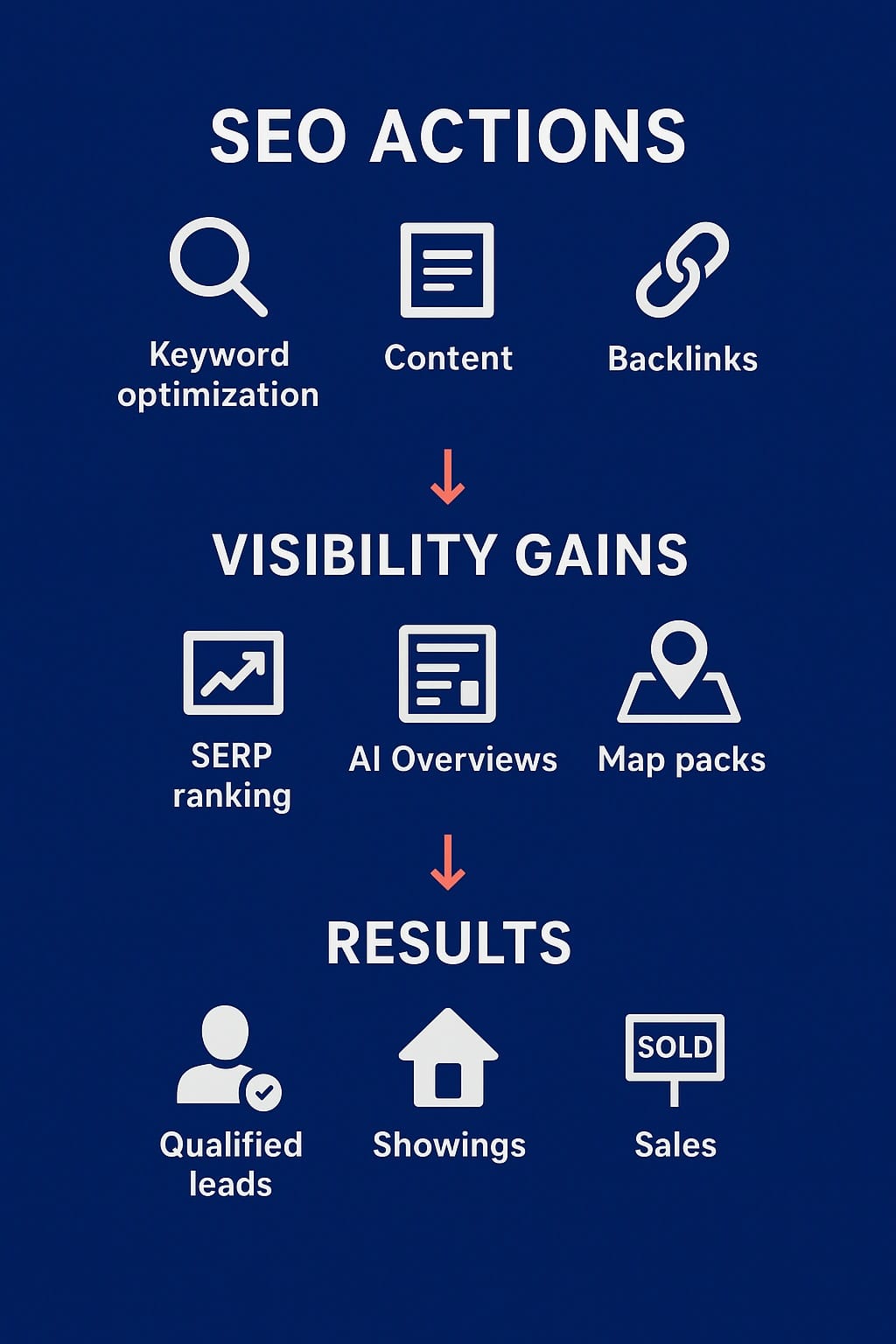
Why Organic Search Still Beats Paid Ads
You can run Google or Facebook ads, and yes, they’ll get you leads quickly. But here’s the trade-off: when the budget
stops, so does the traffic.
Paid visibility is rented space; SEO is owned equity. Every time you publish an optimized page, earn a backlink, or
refine your content, you’re building something that keeps working even when you’re not spending.
That’s the real difference between SEO and paid ads….
SEM (Search Engine Marketing) delivers instant exposure, which is perfect for new listings or time-sensitive launches,
but SEO compounds value. It’s slower to start, but once momentum builds, it becomes your most sustainable source of
real estate leads.
Organic search also carries credibility. People tend to trust the agents they discover rather than the ones who interrupt
their scroll.
Ranking organically for high-intent searches like “top realtor in Toronto” or “homes for sale in Abuja” signals authority
to both Google and your audience. And because these clicks come from genuine search intent, not ad targeting, they
convert better and cost less over time.
The smartest agents don’t choose one over the other; they use paid ads for speed and SEO for stability. But if your goal
is long-term brand trust and consistent lead generation, organic search will always win the marathon, not just the
sprint.
What Google’s Latest Updates Mean for Realtors
Google’s 2025 algorithm updates are brutal for thin, copy-paste content. Sites that only regurgitate listing data are
tanking.
Why?
Because Google (and now, AI-driven search engines) reward depth, clarity, and experience.
Real estate SEO now means blending structured listing data with human insight — the kind that sounds like it came
from someone who’s actually walked through the home. That authenticity gives you staying power, even as algorithms
evolve.
How AI and Generative Search Are Changing Real Estate Visibility
This one’s big. AI search, or Generative Search Experience (SGE) now decides what people see before they even click.
If your site doesn’t feed structured, verified, and context-rich information, you’re invisible to these systems.
So SEO in 2025 isn’t just about ranking on Google’s page one. It’s about becoming the source AI trusts enough to quote.
That’s where GEO (Generative Engine Optimization) and AEO (Answer Engine Optimization) come in….
0ptimizing your site for how AI interprets, summarizes, and references your content.
Read articles for Generative Engine Optimization and Answer Engine Optimization for more in-depth look into how to
get cited in AI search engines.
What Is Real Estate SEO (and How It Differs from Regular SEO)?
Real estate SEO is the process of optimizing your website, listings, and digital presence so potential buyers, sellers, or
investors can easily find you in search results. It’s similar to regular SEO in principle: improving visibility, structure,
and content.
But the difference lies in who you’re targeting and how they search.
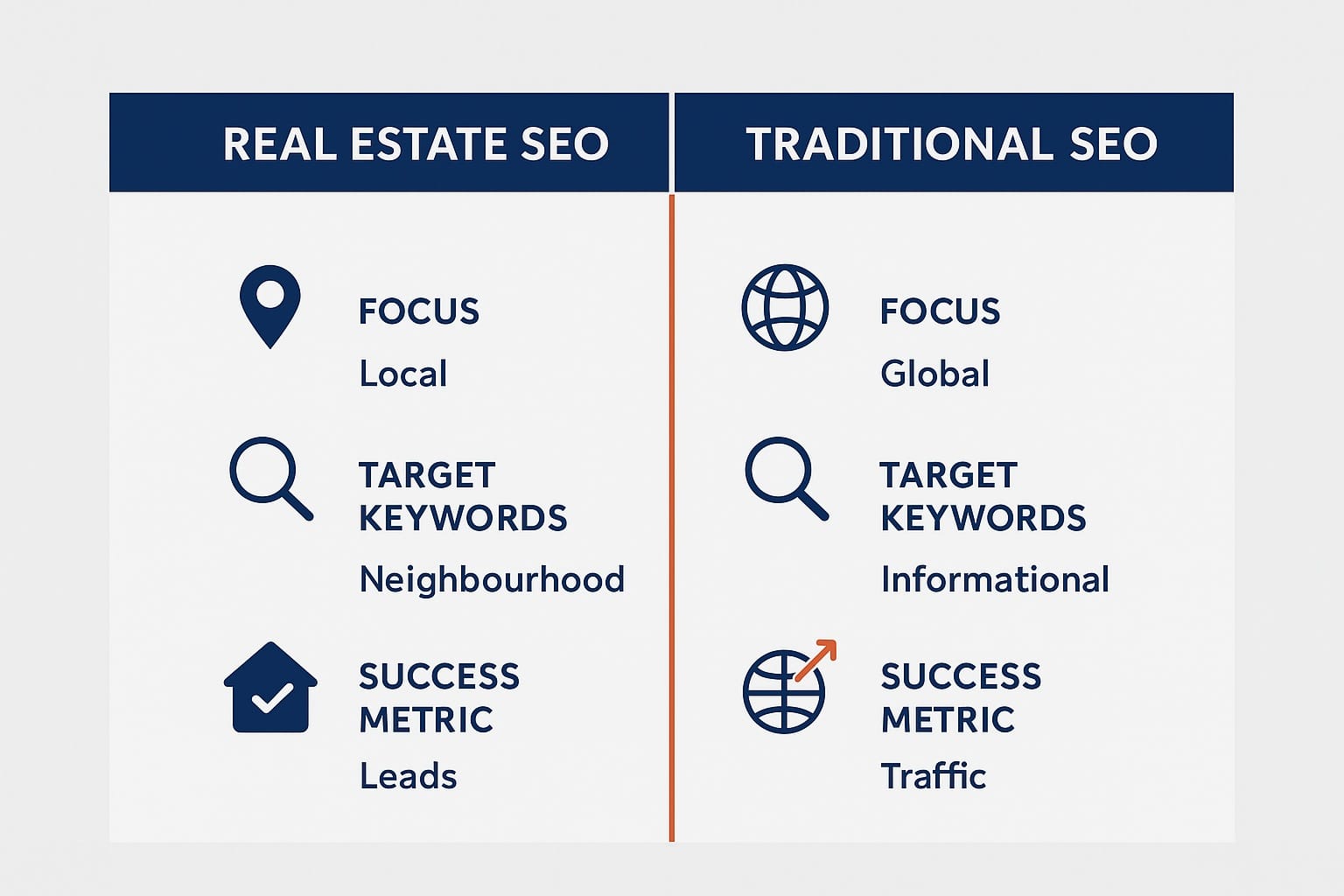
Instead of broad, industry-agnostic keywords, real estate SEO focuses on hyperlocal intent like “homes for sale in
Toronto” or “buy property in Lagos.” It’s not just about being found; it’s about showing up where real decisions
happen.
So, how can SEO help with lead generation for real estate agents? By meeting intent at the exact moment it appears.
When someone searches for homes, valuations, or agents in their area, an optimized website connects that query to
your service, gradually turning interest into making a phone call to your agency, inquiry via email, or submitting a
contact form
Over time, this builds a steady pipeline of organic leads that compound month after month, without relying solely on
paid ads.
And how can a real estate website be optimized for lead generation? Fast-loading pages, mobile responsiveness, and
simple navigation help visitors find what they need quickly.
However, real lead generation occurs when you combine technical precision with emotional relevance (use strong
visuals, local proof, and a clear call-to-action per page).
Every property description, every neighbourhood page, every review plays a small role in building trust. When done
right, your website stops being just a brochure; it becomes a living system that attracts, nurtures, and converts the right
kind of traffic into real clients.
| Category | SEO (Organic Search) | SEM (Paid Search / Ads) |
| Cost | Requires upfront effort but low long-term cost. You build lasting equity with each optimization. | Pay-to-play model; visibility stops when ad spend stops. Ongoing budget required. |
| Speed of Results | Slow and steady. Results build over months as authority and rankings grow. | Immediate visibility. Great for new listings or quick lead spikes. |
| Lead Quality | Higher-quality leads from intent-driven searches. Visitors are actively researching or ready to act. | Can produce fast leads, but some may be lower-intent or driven by curiosity clicks. |
| Credibility | Builds long-term trust and authority. Organic rankings feel earned, not bought. | Users may experience “ad fatigue” or ignore sponsored listings. |
| Sustainability | Compounding returns. Content continues to generate leads long after publishing. | Temporary results. Once the campaign ends, so does traffic |
| Analytics & Control | Organic performance can be tracked via GA4 and GSC; growth reflects real authority. | Granular tracking and audience targeting; ideal for controlled, short-term campaigns. |
| Best Use Case | Establishing long-term digital presence and passive lead generation. | Promoting new listings, developments, or short-term offers. |
Core Principles of Real Estate SEO
It’s hyperlocal. Data-heavy. Emotion-driven. You’re not selling sneakers; you’re helping people make the biggest
purchase of their lives. That means your SEO must combine precision (technical) and persuasion (content).
The foundation:
- A fast, mobile-optimized site
- Clean structure (listings → neighbourhood pages → blog)
- Schema markup that helps search engines understand property details
- Content that speaks to buyers and sellers, not just bots
How Search Engines Interpret Property Listings
Think of Google as a translator. It doesn’t see your stunning photos; it reads your metadata, alt text, and structured
data.
A listing with proper schema markup for “house for sale,” “price,” “bedrooms,” “availability,” and “location” stands out
in search results with richer previews.
If your listings lack schema or contain duplicates (sold or expired pages), you lose trust signals fast.
Understanding Buyer vs. Seller Search Intent
A buyer searches “condos for sale near downtown Ottawa.” A seller types “how much is my home worth in 2025.”
Those are different intents, and your SEO must treat them differently. Create buyer content (neighbourhood guides,
listings, property comparisons) and seller content (pricing strategies, staging tips, market reports).
That separation builds topical authority across both audiences (a major ranking factor in 2025).
The Relationship Between SEO, Content, and Lead Generation
Good SEO isn’t just about getting traffic; it’s about getting qualified traffic. The goal isn’t a spike in impressions, it’s
consistent visibility that turns into inquiries and calls.
Every optimized page is a potential entry point into your sales funnel.
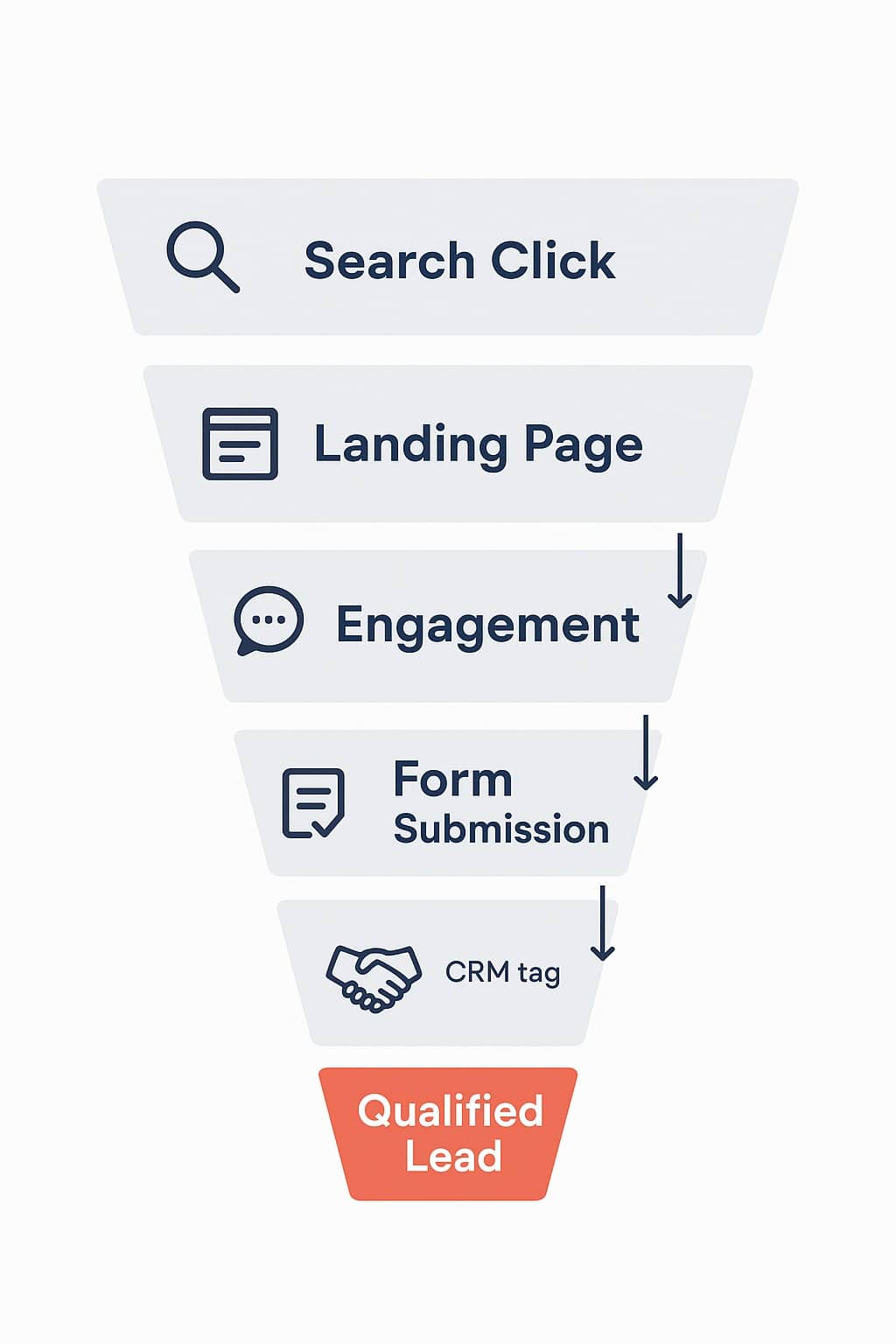
How to Build a Winning Real Estate SEO Strategy
Step 1: Audit Your Website and Identify SEO Gaps
Start with a full audit: technical, content, and backlink. Tools like Ahrefs, SEMrush, and Google Search Console reveal
crawl errors, missing meta data, and broken links.
Ask:
- Are my listing URLs properly structured?
- Are my pages optimized for mobile?
- Is there duplicate content from old listings?
Fix the foundation before scaling visibility.
P.S. We will go more into the technical SEO bit later.
Step 2: Set Measurable Goals and KPIs (Traffic, Leads, Conversions)
Define success before chasing it. Maybe it’s 50% more organic leads or ranking top 3 for “realtor in Ottawa.”
Use metrics like:
- Click-through rate (CTR)
- Lead conversion rate
- Cost per organic lead
SEO isn’t a guessing game; it’s data-informed compounding growth.
Step 3: Research High-Intent Keywords for Real Estate Niches
Skip the vanity terms like “real estate agent.” They’re too broad.
Focus on buyer intent (“homes for sale in Russell Ontario”) or seller intent (“sell my house fast Ottawa”).
Use keyword research tools to map content to funnel stages. For instance:
- Top of funnel: “real estate market trends 2025”
- Middle: “how to get more real estate leads with SEO”
- Bottom: “best real estate seo agency Canada”
Step 4: Build a Scalable Content and Link Structure
Each neighbourhood or community should have its own page, linking internally to listings, market data, and blog
guides.
This creates a topical map, the signal Google and AI engines love.
Step 5: Create a Tracking Framework for Continuous Growth
Install analytics dashboards that track rankings, backlinks, conversions, and ROI. SEO is never “done.” It’s iterative.
The agents who win are those who adapt monthly, not yearly.
Technical SEO Foundations for Real Estate Websites
Your website is the engine.
If it’s slow, confusing, or broken — no amount of content will save it.
Let’s fix that.
Site Speed, Mobile Optimization, and Core Web Vitals
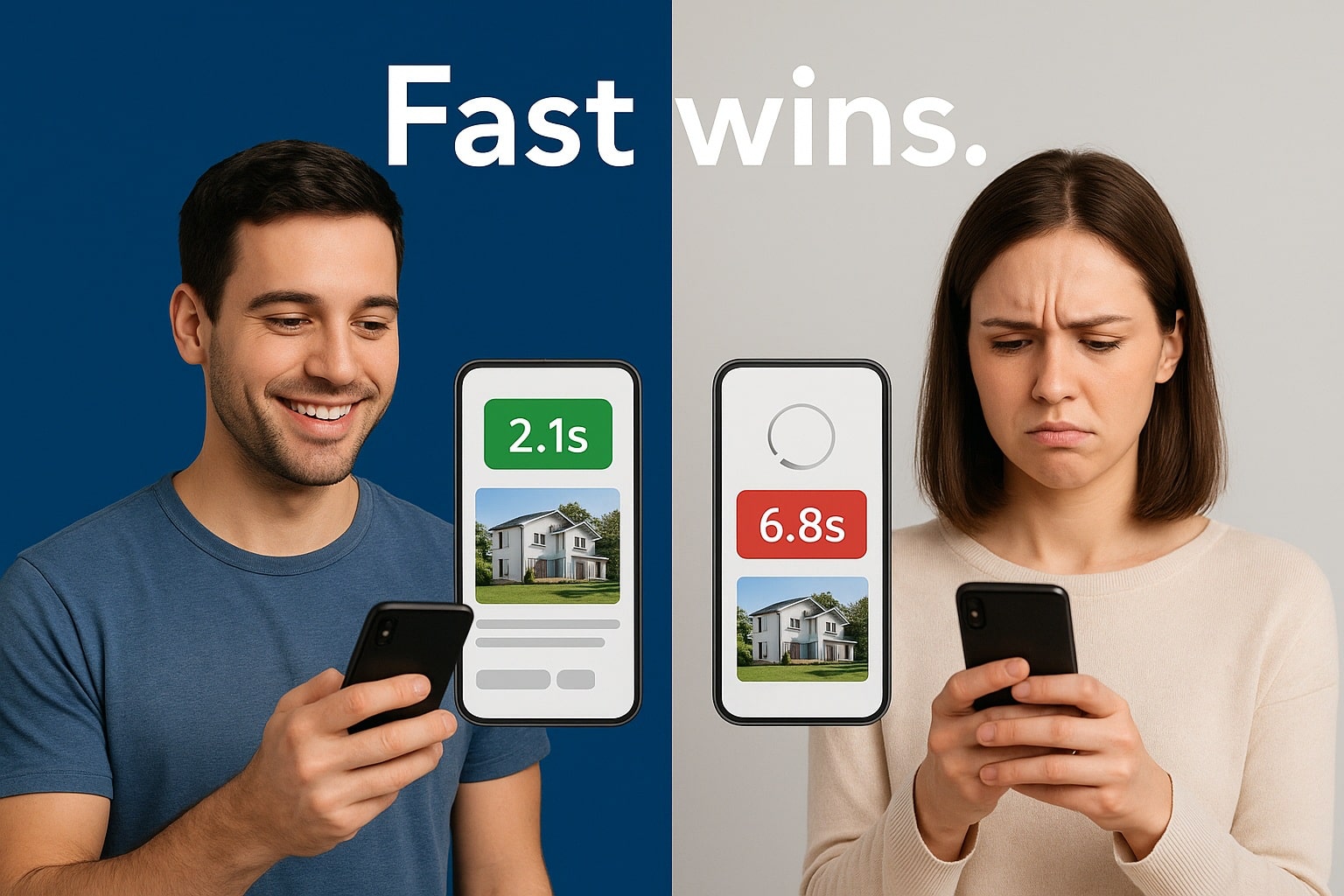
People browse listings on their phones — often while standing in a driveway, checking another agent’s site. If your pages
take longer than three seconds to load, they’re gone.
Literally.
Optimizing for speed and mobile responsiveness isn’t optional; it’s survival. Compress images, simplify code, and run
your Core Web Vitals reports regularly.
Structuring URLs for Neighborhood and Listing Pages
Keep URLs human and clean.
Think:
yourdomain.com/ottawa/nepean/homes-for-sale
instead of:
yourdomain.com/index.php?id=9832.
Simple structure signals clarity to both users and Google. It also helps when your listings expand — because every
neighbourhood deserves its own digital footprint.
Schema Markup for Listings, Agents, and Reviews
Schema is the hidden language of SEO. It tells Google and AI systems exactly what your content means.
Use RealEstateListing schema for properties; Agent schema for profiles; And Review schema for client
feedback.
Structured data builds trust. Both with search engines and with future clients who see you featured in those little
knowledge panels or local snippets.
Handling Duplicate, Sold, or Expired Listings
Never delete — redirect or archive.
Old listings still carry authority and backlinks. Use canonical tags and 301 redirects to preserve that equity. Treat each
update like housekeeping: clean quietly, but never throw away the furniture.
ADA Compliance, HTTPS, and Crawl Efficiency
Accessibility isn’t just legal — it’s moral.
Use alt text on every image. Maintain HTTPS for security and trust. Make sure your menus are simple, crawlable, and
readable by screen readers.
A well-structured, fast, accessible website isn’t just about SEO; it’s about respect ; for your users, your brand, and the
people your listings aim to serve.
On-Page SEO for Realtors and Real Estate Websites
Details matter.
They’re what make a good real estate page feel trustworthy — not just look polished.
Optimizing Title Tags, Meta Descriptions, and Header Tags
Your title tag is the handshake. It tells both Google and your visitor what to expect.
Make it answer a question or offer a clear benefit:
“Homes for Sale in Casselman | Modern Listings by Local Experts.”
Meta descriptions should invite curiosity, not clutter it. Keep them under 160 characters, clear, and conversational.
Each heading should guide the reader naturally — like a signpost, not a sales pitch.
Crafting High-Converting Property and Neighbourhood Pages
Add real data. Median home prices. School ratings. Commute times. Even the best nearby coffee shop.
It’s the details that make people imagine themselves living there.
Write for emotion and logic together. Facts earn trust; humanity makes it stick. Avoid templates that sound like every
other agent — you’re local, your copy should sound like it too.
Internal Linking for Topic Clusters (Listings → Guides → Blogs)
Every page should connect to something else.
Your listings should link to neighbourhood guides. Your blogs should link back to listings. That cross-linking tells
Google your site doesn’t just mention a topic — it owns it.
Think of it as a network, not a collection of pages. The tighter the web, the stronger the authority.
Writing Content that Balances Keywords and Human Readability
Don’t obsess over keywords. Obsess over clarity.
If you wouldn’t say it out loud, don’t write it.
Instead of repeating “real estate SEO” twenty times, use variations that sound natural: property marketing, search
visibility, ranking your listings.
Write how people think — not how algorithms parse. Because in 2025, those two are finally the same thing.
Using AI Tools Responsibly for Content Optimization
AI can help. Drafts, outlines, keyword maps — it’s great for that.
But your voice, your empathy, your lived experience — that’s what converts.
Use AI as a starting point, not a substitute. The best-performing content is still human at its core — precise, real, and
written with intent.
Local SEO: How to Rank in Your City and Neighbourhood
Real estate is local.
Always has been.
Search engines just changed where “local” happens.
Google Business Profile Optimization for Realtors
Start here. Claim your Google Business Profile.
Add photos that look real, not staged. Post updates. Answer Q&As. Pick categories that match how clients actually
search.
Your profile often ranks higher than your website for local intent — “realtor near me”, “homes for sale in Embrun”.
Keep it alive.
Managing Reviews and Online Reputation
After every transaction, ask for feedback.
A quick message. A short link. A gentle nudge.
Don’t skip the tough reviews; how you respond says more about your brand than the rating itself….
Search engines reward engagement, but more importantly, people trust agents who listen.
Building Local Citations and NAP Consistency
Your Name, Address, and Phone Number should match everywhere — Realtor.ca, Yelp, Facebook, Google Maps.
No small typos, no outdated addresses.
When you show up the same way everywhere, Google notices. So do people. It’s how the web learns to trust that you’re
real — and that you belong here.
Creating Hyperlocal Content (Neighbourhood Guides, Market Reports)
Write for people who live where you sell.
Not “best areas in Ontario.” That’s too vague.
Try “Top 5 Family-Friendly Neighbourhoods in Ottawa” or “Market Trends in Downtown Lagos.”
Real stories. Real streets. That’s how you win local search.
Local Link-Building Strategies for Realtors
Links don’t have to come from SEO blogs.
Partner with local schools, community centres, or charities.
Each local backlink tells Google you’re part of the ecosystem — not just another site chasing clicks.
Voice Search and “Near Me” Optimization for Property Searches
People don’t type the same way they talk.
They ask: “Find homes for sale near downtown Russell.”
Build FAQ pages around those natural questions. Use conversational phrasing in your headings and meta descriptions.
That’s how you capture voice-search traffic before your competitors even realize it exists.
Link Building and Authority Growth for Real Estate Websites
Link Building and Authority Growth for Real Estate Websites
Backlinks are trust signals.
Not all of them matter — but the right ones can change everything.
What Makes a Backlink Valuable in Real Estate
Relevance and authority always beat volume. A single link from a trusted local news site, real estate board, or respected
publication is worth more than a dozen random blog mentions. Google knows when a link feels genuine. So does your
audience.
Proven Outreach Strategies: PR, Sponsorships, and Partnerships
Get creative with how you earn attention. Sponsor a neighbourhood event. Publish local market insights. Partner with
interior designers or home inspectors on content. These collaborations don’t just look good — they earn natural
backlinks from credible, local sources.
PR doesn’t have to mean press releases; sometimes it’s just about being visible in the right communities.
Building Authority through Guest Posts and Data Reports
Nothing builds backlinks faster than original insight.
Create something worth citing — a “2025 Ontario Housing Trends Report,” or a data-backed “Local Market Confidence
Index.” When other professionals reference your findings, Google sees you as a source, not just another site.
Authority isn’t claimed. It’s earned, over time, through evidence.
How to Avoid Low-Quality or Spammy Links
If a backlink offer looks cheap, irrelevant, or automated — skip it.
Toxic links can quietly drag your rankings down, and recovering from a penalty is harder than building clean links from
the start. Quality links take patience, but they last.
When in doubt, ask: would I proudly show this source to a client? If not, it’s not worth the risk.
Tracking Domain Authority and Backlink Impact
Keep an eye on your growth. Use Ahrefs, Moz, or Google Search Console to monitor backlink profiles and Domain
Authority trends.
Strong backlinks don’t just boost rankings — they shape how AI systems interpret your site’s reliability. The more
credible your digital footprint, the more confidently search engines (and users) trust what you publish.
Over time, those links form something bigger: reputation. And in real estate, that’s everything.
Content Strategy and Blogging for Real Estate SEO
Content drives discovery. But the right kind of content drives leads.
Types of Content That Drive Real Leads
Guides. FAQs. Checklists. Even simple tools.
They work because they answer the exact questions your clients are typing into Google.
Think “How to Prepare Your Home for Sale in 2025.” That kind of post doesn’t just inform — it pre-sells. It draws in people with real intent, not just casual browsers
How to Use Keyword Clusters to Dominate a Market Segment
Don’t write in isolation. Build around clusters.
Start broad — maybe “Ottawa Real Estate SEO.” Then branch out into supporting pieces like “Local SEO,” “Content
Strategy,” “Automation.”
Each one links to the other. Each reinforces the main topic. That’s how you start owning an entire conversation, not just
one keyword.
Incorporating Video, Virtual Tours, and Visual Content
People don’t just read real estate content — they watch it, feel it.
Add 360° tours, short walk-throughs, or honest “behind the scenes” clips.
Embed your YouTube videos directly in posts; they keep visitors around longer, and Google notices when people stick
around.
Building Evergreen vs. Timely Real Estate Content
Mix your content calendar. You need both.
Evergreen pieces — like how-to guides or neighbourhood profiles — bring in steady traffic.
Then balance them with trend-based posts: 2025 housing predictions, interest rate updates, AI in real estate
marketing.
One keeps you relevant. The other keeps you visible.
Creating Internal Link Networks Between Blog Posts and Listings
Internal links are like quiet invitations.
A blog about “Best Neighbourhoods in Toronto for Families” should lead visitors to active listings in those areas.
Each link moves them one step closer — from reading, to browsing, to booking a showing.
Content that ranks is good.
Content that converts is better.
Build for both.
Measuring SEO ROI for Realtors
Track what matters.
Conversions, not vanity metrics.
Use forms, tracking numbers, or CRM tags to trace leads back to SEO campaigns.
How We Track Success at Florens Kairos Digitals
We don’t hide behind vague “traffic growth” numbers. Every project includes a custom Looker Studio dashboard
integrating data from GA4, GSC, and Ahrefs.
You’ll see:
- Organic sessions segmented by city (Toronto → Lagos → London)
- Top-performing pages and keyword clusters
- Conversion metrics from forms and booking tools
The goal is full transparency. You always know which clicks are turning into consultations and which tactics are driving
them.
Using Google Analytics 4 and Search Console for Insights
GA4 helps monitor behaviour flows.
Search Console shows what queries bring users in.
Key SEO Metrics Every Realtor Should Monitor
- Organic leads per month
- Average ranking position
- Bounce rate and dwell time
Setting Up Dashboards and Reporting Workflows
Build visual dashboards for weekly or monthly reviews.
This keeps strategy proactive, not reactive.
Real Estate SEO Mistakes to Avoid in 2025
Let’s be honest.
Everyone makes mistakes with SEO.
The trick is learning which ones quietly wreck your credibility — and fixing them before they do.
Over-Optimizing or Keyword Stuffing
It’s tempting.
You want to rank, so you cram every keyword that fits (and a few that don’t). But here’s the thing — Google can tell. And
so can your readers. Over-optimization makes your pages sound robotic, desperate even. Write for people first; optimize
for search second. That balance is what gets you found and trusted.
Ignoring Mobile or Page Experience Metrics
Mobile-first isn’t a trend anymore. It’s the default.
If your site stutters, pinches, or takes forever to load on a phone, you’re invisible where most buyers actually search.
Keep it smooth. Keep it fast. Check your Core Web Vitals often — they’re not vanity metrics; they’re your digital curb
appeal.
Neglecting Local SEO Signals
Google knows location better than most agents.
If your listings, business address, or citations aren’t consistent, you’re telling search engines you don’t quite exist. Claim
your Google Business Profile. Add reviews. Use local schema. Local SEO is what makes you the agent for that area — not
just an agent online.
Not Updating Expired or Old Content
A stale page is like a forgotten listing.
People click, see outdated market stats or sold properties, and bounce. Update your data quarterly. Add new listings,
tweak your copy, refresh your photos. It’s less about rewriting — more about showing that you’re active, aware, and still
in the game.
Relying Too Heavily on AI Without Editorial Oversight
AI drafts. Humans connect.
You can use it to speed things up — sure. But don’t hand it the keys. Readers can feel when something’s written without
a pulse. Always add your perspective, your tone, your insight. Because clients don’t hire content, they hire trust.
Mistakes happen.
But they don’t have to define your site. A little awareness, a little consistency — that’s how you build SEO that lasts.
Future-Proofing Your Real Estate SEO Strategy
Search never sleeps.
And neither should your strategy.
How to Stay Ahead of Google Updates
Google changes the rules quietly, sometimes overnight. One week it’s about backlinks, the next — user signals or AI
summaries. The only way to stay ahead? Stay curious. Follow trusted SEO sources. Test new tactics in small doses. Keep
what works. Drop what doesn’t.
Because in real estate SEO, what you measure today decides what you rank for tomorrow.
The Role of Generative Search (SGE) in Real Estate
Generative search isn’t the future — it’s already here.
AI summaries now blend listings, guides, and brand names into one seamless result. If you’re not part of that
conversation, you’re invisible.
Keep your content factual, structured, and schema-rich. Every property page, agent bio, and blog post should signal
authority and accuracy. Because when AI systems summarize, they pull from what they trust.
If you want to understand how to earn that trust, go deeper into our Guide to Generative Engine Optimization (GEO); it
shows exactly how to make your content visible in AI-driven search.
And don’t miss our breakdown of Answer Engine Optimization (AEO), where we explain how to get your insights
quoted in voice and AI summaries.
The clearer your data, the stronger your structure, the higher your chances of appearing where modern buyers actually
look — in AI Overviews, snippets, and conversational search results.
Why SEO and Branding Will Converge in the Future
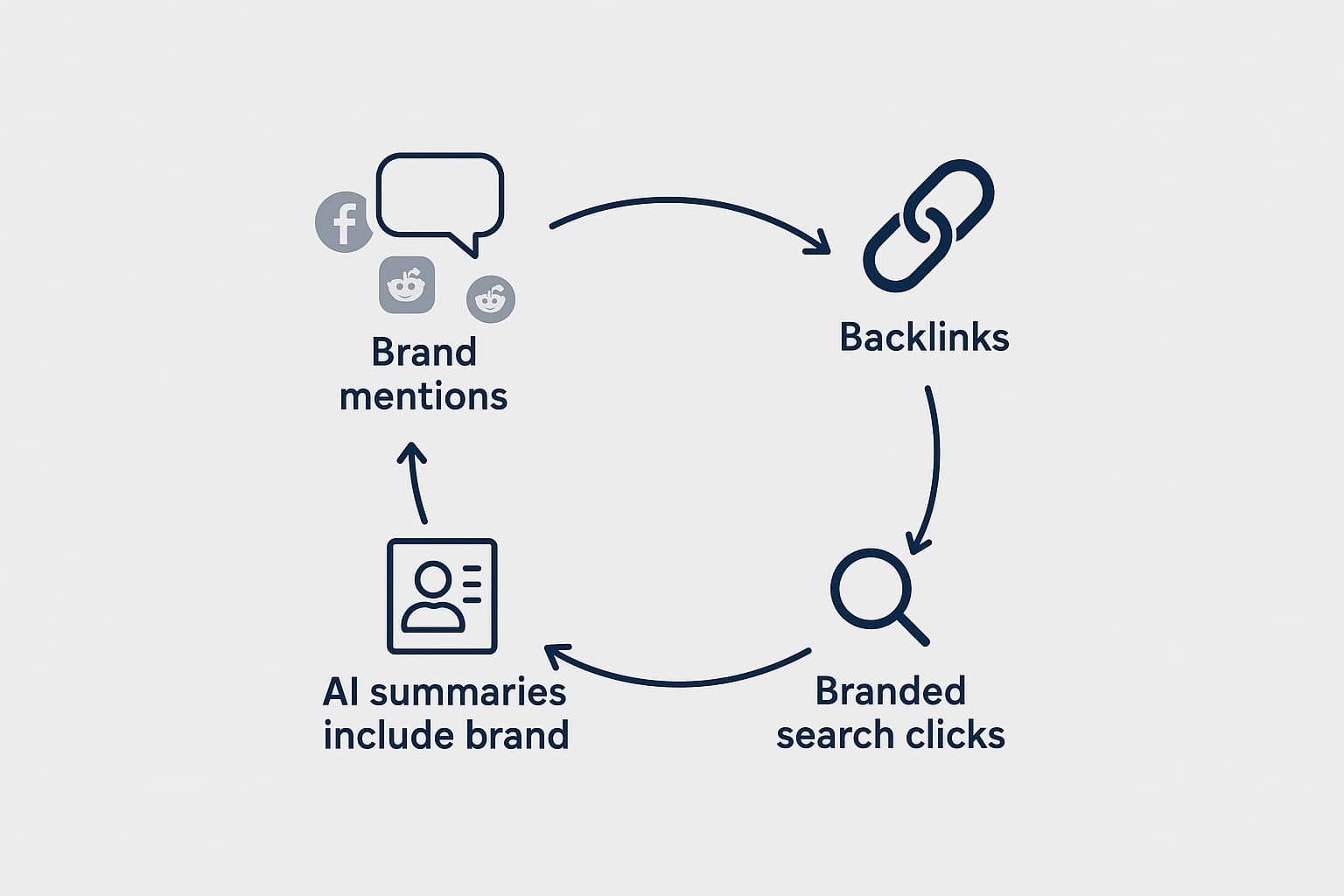
Here’s the truth: ranking is no longer just about keywords.
It’s about credibility. Recognition. Identity.
Google’s AI increasingly favours trusted brands — not just optimized ones. That means your logo, tone, and reputation
now feed your SEO.
In 2025, branding equals visibility. Strong brands get quoted, linked, and surfaced in AI results — even when no
backlinks exist.
That’s why learning how brand SEO actually works is your next strategic edge. It’s the missing link between traditional
optimization and long-term authority. Your name needs to carry weight — across Google, TikTok, YouTube, or
anywhere buyers are searching.
Continuous Learning: SEO Isn’t Set and Forget
Search evolves. Daily.
What works now may fade next quarter. Keep reading. Keep testing. Keep showing up.
Because the agents who learn faster — adapt faster — always win the visibility game.
Finally….Turn Search Visibility into Sales
You can’t sell homes people can’t find.
That’s the hard truth.
But when your SEO is intentional — structured around real buyer behaviour and local search patterns — visibility stops
being luck. It becomes predictable. And predictable traffic? That’s measurable success.
How to Turn Organic Traffic Into Converting Leads
Most visitors won’t call you on their first click. They need a nudge.
Use clear calls-to-action that feel natural — “Book a viewing.” “Get your free property valuation.” Add a chat widget for
quick questions. Pair it with an email follow-up sequence that builds trust over time.
The goal isn’t to pressure. It’s to guide. Every search visit should have a next step — a form, a message, or a small win
that brings them closer to working with you.
Real estate SEO doesn’t end with traffic. It ends with a handshake, a booking, a sale.
Why Partnering With a Real Estate SEO Agency Delivers Long-Term ROI
The truth? You could do it yourself.
But most agents don’t have the time — or the data systems — to track how SEO actually performs.
A good agency doesn’t just write content or fix your site. It helps you build authority. In Google. In AI-driven search.
And in the minds of your audience.
At Florens Kairos Digital, that’s what we focus on — connecting GEO (Generative Engine Optimization) with AEO
(Answer Engine Optimization) so your name shows up not only in traditional search results, but also in AI overviews,
snippets, and local recommendations.
That’s where trust is built now. Quietly. Repeatedly.
Let’s Turn Your Visibility Into Actual Leads
SEO isn’t theory.
It’s the quiet system behind every modern real-estate success story.
If you’re an agent or small brokerage ready to build a consistent flow of qualified inquiries — not just clicks — we can
help.
You can Book a Strategy Consultation.
No pressure….
Just an honest look at what’s possible when your visibility starts working as hard as you do.



